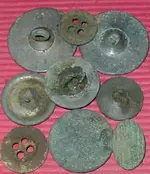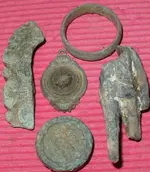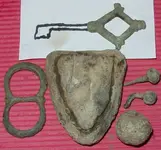CRUSADER
Emerald Member
We waited awhile in the hope that the rain would stop. It didn't so, on with the waterproofs. It was raining when we started & raining when we finished, thankfully the clay soil was past the sticky stage as it was too wet. We managed 2 hours which is enough when your waterproofs aren't keeping out the water anymore (too cheap to buy another set) 
The best finds were:
Broken Medieval Casket key of a design I haven't seen before.
Roman & Medieval Pinheads
Spectacle buckle
My fav of the day, a Lead Medieval Trade Weight. I've been wanting one of these but hope for a nice one with a lion or other marking on the top. Still its our first & Dad found it in his usual way & thought it was a Victorian Toy Iron.

The best finds were:
Broken Medieval Casket key of a design I haven't seen before.
Roman & Medieval Pinheads
Spectacle buckle
My fav of the day, a Lead Medieval Trade Weight. I've been wanting one of these but hope for a nice one with a lion or other marking on the top. Still its our first & Dad found it in his usual way & thought it was a Victorian Toy Iron.

Amazon Forum Fav 👍
Attachments
Upvote
0












